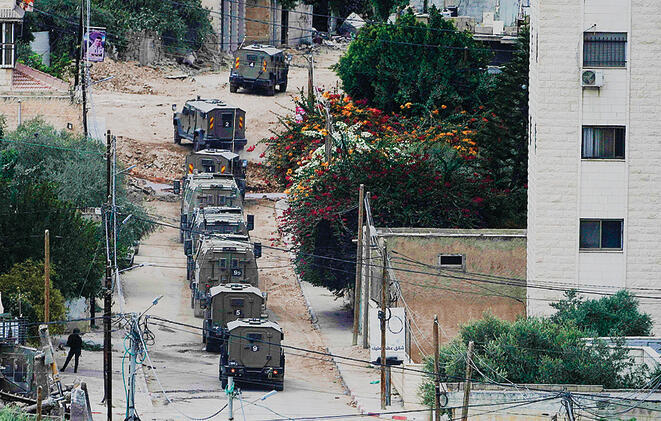Getting your Trinity Audio player ready...
For nearly a year, IDF and Shin Bet have managed to maintain the West Bank as a secondary front compared to Gaza, despite warnings it could ignite at any moment. Recent events, including the attack that claimed three lives near Tarqumiyah on Sunday morning, underscore how only sheer luck has prevented this escalation thus far, which does not constitute sound strategy, and these incidents must be treated as wake-up calls, signaling this may no longer be the secondary theater.
We are witnessing a significant escalation in the nature of terrorism. Gone are the days of knife stabbings from the 2015 terror wave that led to Operation Guardian of the Walls. Nor are we seeing just the shooting attacks of 2022, which sparked Operation Wavebreaker. We are now dealing with powerful explosives reminiscent of the Second Intifada. One such device nearly detonated in a home in southern Tel Aviv, planted by a terrorist from the West Bank.
Defense Minister Gallant visits the West Bank
(Video: Elad Malka)
These attacks are not spontaneous but rather carefully orchestrated. There is an infrastructure in place, with a driver and a bomb maker, backed by financiers. Just a couple of weeks ago, a car bomb exploded in the Hebron area, involving two terrorists who intended to attack Jews. This incident should have raised a glaring red flag. Simply put, the organized plot that went undetected is a dramatic oversight by the General Security Service, which must scrutinize its lapses. Despite numerous successes in the day-to-day battle against terror, it must now preemptively detect this kind of terrorism.
Until now, IDF and Shin Bet have managed to contain terror hotspots in the West Bank. Recently, they've encountered numerous explosive devices in the northern Jordan Valley, discovered the declining age of militants, and noted that these operatives are no longer part of known terrorist gatherings. Instead, they are local residents, driven by Iranian funding and explosives smuggled across the porous Jordanian border and the punctured separation barrier, which allows not only workers but also terrorists to infiltrate.
This has prompted the IDF to launch a recent operation aimed at dismantling Palestinian terrorist capabilities in the West Bank as part of the ongoing war. The current danger is that terrorism could spill over into the Hebron area, considered the Hamas terror capital in the West Bank and home to organized and dangerous terror cells. The attack near Tarqumiyah this morning indicates this threat is only intensifying.
If Khaled Mashal's recent call to "return to suicide bombings" is heeded, we may enter a very challenging period. Most skilled regular and reserve forces are currently stationed in the Gaza Strip and the northern border, necessitating their redeployment to the Central Command. Thus, had the recent attacks unfolded as planned, the West Bank could have become the primary battleground.
Over the weekend, a terrorist cell from Hebron dispatched two terrorists with car bombs. At the Gush Etzion junction, a booby-trapped car exploded, likely due to a "work accident," and the terrorist who managed to escape attempted to attack the responding forces and was neutralized. Another terrorist breached the nearby settlement of Karmei Tzur with another booby-trapped car—the security officer engaged, ramming it with his vehicle and opening fire, causing it to explode. This night ended with three moderately and lightly injured in the two attacks. It could have ended with a double-digit death toll.
The operation in the northern section of the West Bank exacted a heavy toll when, during the fighting in Jenin—the operation's main focus—Elkanah Navon, 20, from Petah Tikva, a platoon commander in the 906th Battalion of the Bislach Brigade, was killed. A combat officer from the same battalion was seriously injured in a skirmish with the terrorists. Besides him, two other soldiers were lightly injured. The operation involves hundreds of fighters working in the area to break up terrorist rings and uncover hidden explosives along or beneath routes. As of last night, at least about 30 terrorists have been eliminated in the operation.
IDF Chief of Staff Herzi Halevi entered Jenin and told the fighters: "Look at this attack and what you are doing here. Entering the refugee camps is precisely the idea that the terrorists will not be able to load the explosives onto the car bomb and go out and carry out an attack in a settlement, against our forces, or anywhere else. From here, the offensive idea of entering places where sabotage capabilities are being built is very important." This statement encapsulates the exact type of activity IDF will need to undertake from now on—penetrating into the cities, into the terror hotspots, and thwarting the next car bomb attack there. It will be more complex, and we will have casualties, but there is no other way to stop the explosive belt that murders innocents in Gush Etzion or Tel Aviv.
Regarding the Philadelphi Corridor and the confrontation between the Minister of Defense and the Prime Minister, Gallant and heads of the defense establishment support a withdrawal from the corridor to save the lives of 20 hostages (possibly more) and retrieve about 15 bodies. Netanyahu argues: If we leave there, we won't be able to return to fight, and Hamas will resume smuggling weapons. Gallant and the military emphasize that during this time, there will be no possibility of returning to dig tunnels. Netanyahu responds: We won't be able to return to fight after 42 days. The Americans won't allow it.
The defense establishment claims they are committed to returning to fight because we still have hostages and because it is stated in the agreement that will be approved by the government, and therefore it is necessary to return whoever can be alive. This argument joins the IDF's announcement from last night that it has located several hostage bodies in the Gaza Strip.
In a short and dramatic announcement, it was stated that the identification and extraction process is still ongoing. Extracting hostages who are not alive only sharpens the assessment that, in this case, the defense establishment and Gallant are correct.







